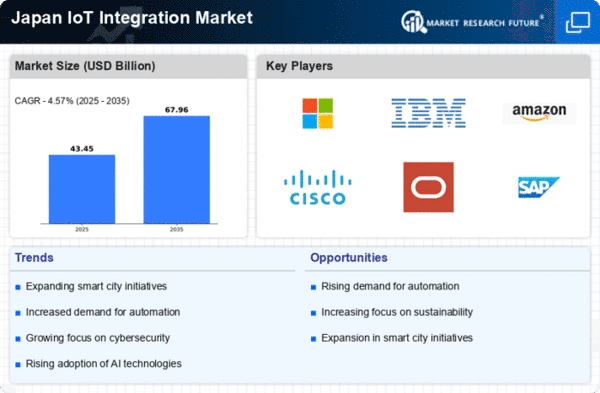Rising Demand for Automation
The IoT Integration Market in Japan experiences a notable surge in demand for automation across various sectors. Industries such as manufacturing, logistics, and agriculture are increasingly adopting IoT solutions to enhance operational efficiency and reduce costs. According to recent data, the automation sector is projected to grow by approximately 15% annually, driven by the need for real-time data analytics and process optimization. This trend indicates a shift towards smart factories and automated supply chains, where IoT integration plays a crucial role. As companies seek to streamline operations and improve productivity, the iot integration market is likely to benefit significantly from this growing demand for automation.
Growing Focus on Data Security
As the IoT Integration Market expands in Japan, concerns regarding data security and privacy become increasingly prominent. Businesses are recognizing the importance of safeguarding sensitive information transmitted through IoT devices. The implementation of robust security measures is essential to protect against potential cyber threats. According to industry estimates, the cybersecurity market in Japan is projected to grow by 20% annually, reflecting the heightened focus on securing IoT ecosystems. This emphasis on data protection is likely to drive demand for integrated IoT solutions that prioritize security, thereby influencing the overall growth of the iot integration market.
Government Initiatives and Support
The Japanese government actively promotes the adoption of IoT technologies, which significantly impacts the IoT Integration Market. Initiatives such as the 'Society 5.0' vision aim to create a super-smart society by integrating advanced technologies into everyday life. Financial incentives and grants are provided to businesses that implement IoT solutions, fostering innovation and development. Reports suggest that government funding for IoT projects could reach ¥1 trillion by 2025, indicating a strong commitment to enhancing the country's technological infrastructure. This supportive environment is expected to drive growth in the iot integration market, as more companies leverage government resources to adopt IoT technologies.
Advancements in Connectivity Technologies
The evolution of connectivity technologies, such as 5G and LPWAN, is transforming the landscape of the IoT Integration Market in Japan. These advancements enable faster data transmission and improved device connectivity, facilitating the deployment of IoT applications across various sectors. The introduction of 5G technology is expected to enhance the performance of IoT devices, allowing for real-time data processing and communication. Market analysts predict that the adoption of 5G will lead to a 30% increase in IoT device connections by 2026. This technological progress is likely to create new opportunities for the iot integration market, as businesses seek to leverage enhanced connectivity for innovative solutions.
Increased Consumer Awareness and Adoption
Consumer awareness regarding the benefits of IoT technologies is on the rise in Japan, positively impacting the IoT Integration Market. As individuals become more familiar with smart home devices, wearable technology, and connected appliances, the demand for integrated IoT solutions grows. Market Research Future indicates that the smart home segment alone is expected to reach ¥1.5 trillion by 2025, driven by consumer interest in convenience and energy efficiency. This growing adoption among consumers encourages businesses to invest in IoT integration, further propelling the market's expansion. The shift towards a more connected lifestyle suggests a promising future for the iot integration market in Japan.

















